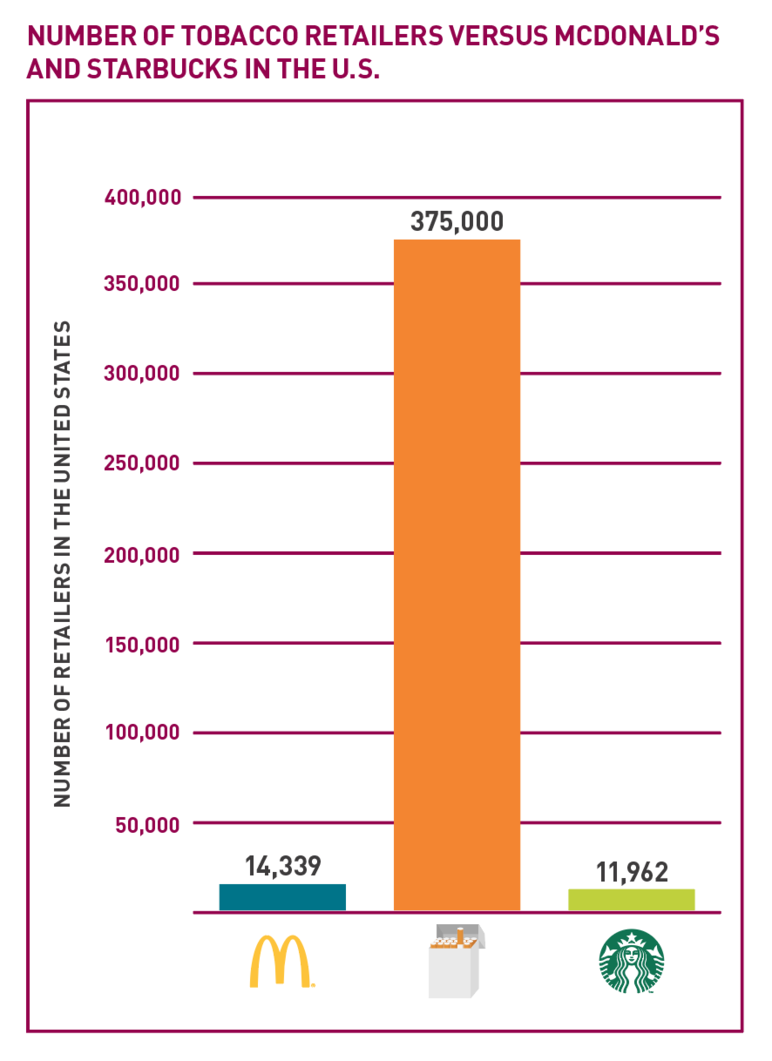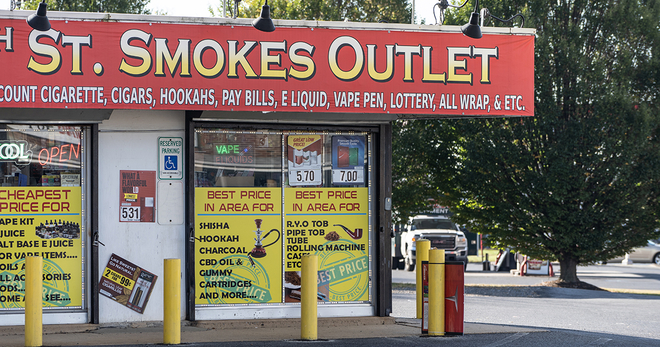How some local governments are keeping the number of tobacco retailers in check
Tobacco companies spent over $8.6 billion on marketing in retail establishments, also called point-of-sale marketing, in 2014 (the most recent figures available). This article is part of a series highlighting ways that states and localities are countering the deep pockets of the tobacco industry with policies regulating where and how tobacco products are sold.
With an estimated 375,000 tobacco retailers in the U.S.—about 27 times more than McDonald’s and 28 times more than Starbucks—local governments are acting to protect public health by limiting where tobacco products can be sold.

Measures to restrict tobacco retailer licensing and density are one way to combat the impact of tobacco retail marketing—also called point-of-sale marketing—which is linked to impulse purchases of tobacco products, an increased likelihood of young people starting to smoke and decreased success for people attempting to quit smoking.
Point-of-sale marketing, which includes advertisements and things like discounts and product displays behind check-out counters, is the tobacco industry’s leading marketing strategy. Tobacco companies spent over $8.6 billion on point-of-sale marketing in 2014 (the most recent year that figures are available).
While no federal regulations exist concerning tobacco retailer licensing and density, here are three ways localities are taking action.
Controlling density
Tobacco retailers are disproportionately located in communities with a greater number of racial and ethnic minorities and low-income populations. In Philadelphia, for example, low-income neighborhoods have 69 percent more tobacco retailers per person. Last year, the city passed a policy that restricts the number of tobacco retailers to one per 1,000 people in each planning district.
Tobacco retailer density policies can also be found in Massachusetts, where 92 municipalities have caps on the number of tobacco retail licenses, and in San Francisco, which caps the number of tobacco retailer permits at 45 in each of the city’s 11 districts.
Prohibiting tobacco retailers near schools
Experimental smoking among youth is linked to the number of tobacco retailers in high school neighborhoods and in communities where youth live. In one study, smoking incidents were significantly higher among students in schools with the highest density of surrounding tobacco retailers, compared with students in schools without nearby tobacco retailers.
Several cities in California, Colorado, Illinois, New York and Wisconsin prohibit tobacco retailers within 500 or 1,000 feet of schools. In Philadelphia, new tobacco retailers can’t be within 500 feet of a school. The same restriction exists in San Francisco, which also prohibits new tobacco retailers from being within 500 feet of another tobacco retailer.
Banning tobacco product sales in pharmacies
In 2016, almost 54,000 pharmacies in the U.S. sold tobacco products. A study from the U.S. Centers for Disease Control and Prevention found that 66 percent of U.S. young adults favor a ban on selling tobacco products in pharmacy stores, including nearly half of smokers.
Experience shows that getting tobacco out of pharmacies can be effective. In September 2014, CVS Health stopped selling tobacco products, and research shows that the move was linked to CVS customers being 38 percent more likely to stop buying cigarettes. Last year, truth® organized a rally to call on Walgreens—one of the country’s largest pharmacy chains—to join CVS and stop selling tobacco products.
Recent years have seen an increase in local legislation concerning tobacco sales in pharmacies. For example, 157 municipalities in Massachusetts, 11 in California, Rock County, Minn. and Rockland County, N.Y., now prohibit pharmacies from selling tobacco products. Additionally, beginning January 1, 2019, pharmacies in New York City will be prohibited from selling tobacco products.
For more information on tobacco industry retail practices, including price, placement and promotion, read our fact sheet and policy resource.
More in tobacco industry marketing
Want support quitting? Join EX Program
By clicking JOIN, you agree to the Terms, Text Message Terms and Privacy Policy.
Msg&Data rates may apply; msgs are automated.



